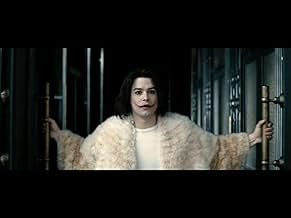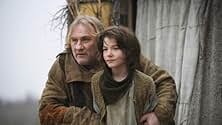VALUTAZIONE IMDb
6,0/10
1472
LA TUA VALUTAZIONE
Aggiungi una trama nella tua linguaA freak show performer's life is turned upside down when he is discovered to be the missing son of a disgraced noble.A freak show performer's life is turned upside down when he is discovered to be the missing son of a disgraced noble.A freak show performer's life is turned upside down when he is discovered to be the missing son of a disgraced noble.
Monika Foris Kvasnicková
- Mary O'Reilly
- (as Monica Foris)
Trama
Lo sapevi?
- QuizFinal film of Nina Jiránková.
- BlooperGiven the setting of the mid 1700s, it is extremely unlikely that milk was purchased in glass bottles, or that fairground performers would have access to drinking vessels made of glass.
- ConnessioniReferenced in Vsechnopárty: Episodio datato 18 gennaio 2013 (2013)
- Colonne sonoreCantus in Memory of Benjamin Britten
Written and performed by Arvo Pärt
Recensione in evidenza
The literary Romantic masterworks by French author Victor Hugo have been banalized and passed to new generations through unfortunate musicals and animated movies, which have little or nothing to do with the atmosphere, passion and ideology of his time, a few years after the events that shocked France with its revolution. «Les miserables» and «Notre Dame de Paris» have been subject to many aberrations, including his novel «The Man Who Laughs», with adaptations that put Gwynplaine, its protagonist, to jump and sing like a puppet. As a matter of fact, he has been turned into a puppet, since he inspired American cartoonists who turned him into the Joker, which is still in the commercial exploitation circuit with all kinds of variations.
The original novel has had better luck in cinema, through the silent film of the same name of 1928, starring Conrad Veidt (of «The Cabinet of Dr. Caligari» fame). Now that I have seen the 2002 adaptation, I feel that Veidt's version, despite his good work, lacks the passion of this one, benefited by sound. For those who do not know the work, it is the story of the son of an English courtier who, when confronting King James, is murdered and his son sold to the band of the Comprachicos, who baptize him Gwynplaine and mutilate his face with a permanent smile. The boy is rescued by the circus Ursus, who raises him along with the blind girl Déa. Many years later, Gwynplaine has the option of claiming his title and place in court, but he fiercely attacks the British nobility.
Mounted with elegant production design (sets, costumes) and good images, thanks to current cinema technology, «The Man Who Laughs» is an enveloping and effective audiovisual experience, although there is a villain in the whole package: composer Stéphane Moucha, who overloads the story with a jingling score that reminds too much of Danny Elfman's music, without the humor of the American composer. Moucha has moved to television, where his type of score seems more relevant.
«L'homme qui rit» is a good reading of Victor Hugo's novel, rich in dark poetic tones, echoing the meaning of the Romantic movement of the 18th century, and it is worthy of revaluation. The good performances of the entire cast, led by the Canadian Marc-André Grondin in the title role, honor this story that exalts the humanity of the common man versus the excesses of the economic power of the nobility, perpetuated by the triumphant bourgeoisie of the 1789 revolution.
The original novel has had better luck in cinema, through the silent film of the same name of 1928, starring Conrad Veidt (of «The Cabinet of Dr. Caligari» fame). Now that I have seen the 2002 adaptation, I feel that Veidt's version, despite his good work, lacks the passion of this one, benefited by sound. For those who do not know the work, it is the story of the son of an English courtier who, when confronting King James, is murdered and his son sold to the band of the Comprachicos, who baptize him Gwynplaine and mutilate his face with a permanent smile. The boy is rescued by the circus Ursus, who raises him along with the blind girl Déa. Many years later, Gwynplaine has the option of claiming his title and place in court, but he fiercely attacks the British nobility.
Mounted with elegant production design (sets, costumes) and good images, thanks to current cinema technology, «The Man Who Laughs» is an enveloping and effective audiovisual experience, although there is a villain in the whole package: composer Stéphane Moucha, who overloads the story with a jingling score that reminds too much of Danny Elfman's music, without the humor of the American composer. Moucha has moved to television, where his type of score seems more relevant.
«L'homme qui rit» is a good reading of Victor Hugo's novel, rich in dark poetic tones, echoing the meaning of the Romantic movement of the 18th century, and it is worthy of revaluation. The good performances of the entire cast, led by the Canadian Marc-André Grondin in the title role, honor this story that exalts the humanity of the common man versus the excesses of the economic power of the nobility, perpetuated by the triumphant bourgeoisie of the 1789 revolution.
I più visti
Accedi per valutare e creare un elenco di titoli salvati per ottenere consigli personalizzati
- How long is The Man Who Laughs?Powered by Alexa
Dettagli
Botteghino
- Lordo in tutto il mondo
- 2.092.903 USD
- Tempo di esecuzione1 ora 35 minuti
- Colore
- Proporzioni
- 2.35 : 1
Contribuisci a questa pagina
Suggerisci una modifica o aggiungi i contenuti mancanti



















